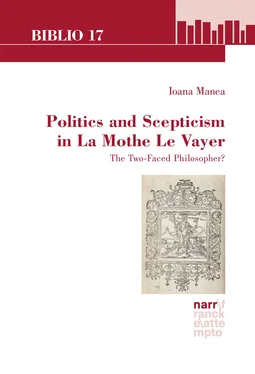Ioana Manea
Politics and Scepticism in La Mothe Le Vayer
The Two-Faced Philosopher?
Narr Francke Attempto Verlag Tübingen
[bad img format]
© 2018 • Narr Francke Attempto Verlag GmbH + Co. KG
Dischingerweg 5 • D-72070 Tübingen
www.narr.de• info@narr.de
Das Werk einschließlich aller seiner Teile ist urheberrechtlich geschützt. Jede Verwertung außerhalb der engen Grenzen des Urheberrechtsgesetzes ist ohne Zustimmung des Verlages unzulässig und strafbar. Das gilt insbesondere für Vervielfältigungen, Übersetzungen, Mikroverfilmungen und die Einspeicherung und Verarbeitung in elektronischen Systemen.
ePub-ISBN 978-3-8233-0114-1
For my family and my friends
The “Plutarch of [his] century”, whose works, in a “prodigious number” (“d’un nombre prodigieux”), were “in everyone’s hands” (“dans les mains de tout le monde”),1 La Mothe Le Vayer possessed great learning, which in addition to underlying a prolific literary career, gave him access to the most exclusive power circles of his time. Born in a family belonging to the noblesse de robe , he inherited the office of assistant attorney-general of the Paris Parliament, which he nevertheless abandoned in order to dedicate himself to writing. Besides the place within the French Academy (1639), his books also earned him other offices. He was the tutor of the Duc d’Anjou, the younger brother of Louis XIV, who would later become the Duc d’Orléans. In addition he was the tutor of the future Louis XIV himself, albeit for a shorter period. He also held the office of State Councillor.2 While being generally acknowledged, the learning that nourished his books and made his great reputation did not always meet unanimous praise. For instance, according to Vigneul-Marville, La Mothe Le Vayer’s writings are “centos” (“rhapsodies”) that “are no longer to our taste” (“ne sont plus de notre goût”), since they can be reduced to “an accumulation of everything that he has found best throughout his readings” (“un amas de ce qu’il avait trouvé de meilleur dans le cours de ses lectures”).3 Vigneul-Marville voices the opinion of the mondains of the time who, while advocating a literature in the French language, disapproved of the “rhetoric of quotations” (“rhétorique des citations”) 4 to which adhered La Mothe Le Vayer, in keeping with the humanist tradition.
Whether appreciated or considered out of fashion, La Mothe Le Vayer was certainly a writer who enjoyed a great reputation à la Cour et à la ville. 5 The rich erudition on which were based his numerous works represented the material that allowed him to defend a Pyrrhonism that found its acme in the Dialogues faits à l’imitation des Anciens which, according to Bayle, contained “a lot of libertinism” (“beaucoup de libertinage”),6 a term that following Furetière’s Dictionnaire universel referred to an irreverent attitude towards religion or ethics. Unlike the Dialogues faits à l’imitation des Anciens , the treatise De l’Instruction de Monseigneur le Dauphin drew Bayle’s attention because of its quality. Indeed, the work on the education of the prince was considered by the author of the Dictionnaire historique et critique as one of the best that La Mothe Le Vayer ever wrote.7
Bayle’s high opinion of the treatise addressed by La Mothe Le Vayer to the Dauphin seems to confirm, among others, its relative success in Italy. Indeed, in 1647, seven years after its publication in France, De l’Instruction de Monseigneur le Dauphin was published in Venice, under the title of Istruttione de’ Prencipi . Furthermore, the seven treatises written for the prince by La Mothe Le Vayer between 1651 and 1658 were published several times under the title of Scuola de’ Prencipi, e de’ Cavalieri , twice in Bologna, in 1676 and 1677, and seven times in Venice between 1677 and 1737. As it results from the article by Lorenzo Bianchi, in his letter to the readers, the translator of Scuola de’ Prencipi, e de’ Cavalieri explained his translation as an attempt to make La Mothe Le Vayer’s didactic work accessible to a wider public, which did not include only princes.8
Unlike the 17 thcentury readers, recent scholarship usually mentions the treatises that La Mothe Le Vayer wrote for the education of the future king in order to point out the duplicity that seems to lie at the core of his work. In so doing, the scholars rely on what they consider to be the contradiction between the books for the prince, which are obviously written in an attempt to collaborate with the powerful and the Dialogues faits à l’imitation des Anciens , which are said to be targeted at any type of political power and especially at the monarchical absolutism from the France of the time. This dual interpretation finds its sharpest expression in the founding study of René Pintard, Le Libertinage érudit dans la première moitié du XVIIe siècle . In the view of Pintard, La Mothe Le Vayer betrays several times the philosophical ideal of the intellectual freedom and rest (“repos”), which is defended by Orontes, his spokesperson in the Dialogues faits à l’imitation des Anciens . One of these times is when publishing the treatises for the future king, since “in a sense the dogmatic Politique du Prince will disown the Pyrrhonian politics of Orasius Tubero” (“en un sens la dogmatique Politique du Prince reniera la pyrrhonienne politique d’Orasius Tubero”).9 Going beyond the ethical judgements, Jean-Pierre Cavaillé argues that La Mothe Le Vayer’s career as a tutor – and, implicitly, we can add, the treatises that he wrote when holding or trying to reach this office – prevented the scholars from “paying attention to Le Vayer’s boldness in the Dialogue traitant de la politique sceptiquement ” (“prêter attention aux audaces de Le Vayer dans le Dialogue traitant de la politique sceptiquement ”) . 10 Enlarging on Cavaillé’s thesis of a La Mothe Le Vayer who dissimulates his aim of undermining power, Sophie Gouverneur argues against his “schizophrenia” (“schizophrénie”) and holds that he develops a “prudence”, which “far from amounting to a hypocritical attitude” (“loin de se réduire chez lui à une attitude hypocrite”), enables him, among other things, to “communicate subversive thoughts in the field of politics and ethics” (“communiquer des pensées subversives en matière de politique comme de morale”).11
The scholars’ broad defence of the idea that La Mothe Le Vayer aims at the “devaluation of politics, but in fact especially of the men in power and of those who pride themselves on the science of power” (“dépréciation de la politique, mais en fait d’abord des hommes de pouvoir, et de ceux qui prétendent à la science du pouvoir”),12 has mostly resulted in an emphasis on the study of the Dialogues faits à l’imitation des Anciens , perceived as the climax of a libertinism and a decrease in the interest for the treatises written for the education of the prince. For instance, placing them in the context of a moment of “golden servitude” (“servitude dorée”), which alternates with the moments of “philosophical freedom” (“liberté philosophique”), Pintard describes the seven treatises written by La Mothe Le Vayer for the prince between 1651 and 1658 as “dogmatic works, of a dogmatism of circumstance” (“œuvres dogmatiques, d’un dogmatisme de circonstance ”).13 Building on the idea of the clear separation between the private and the public spaces, associated either with the freedom of thought, or with the exterior submission to authority, Françoise Charles-Daubert considers that La Politique du Prince , one of the works that belongs to the series mentioned above, is a “school account, essentially inspired by Aristotle and, broadly considering everything, quite less original” (“exposé scolaire, essentiellement inspiré d’Aristote et à tout prendre bien peu original”).14
Читать дальше












